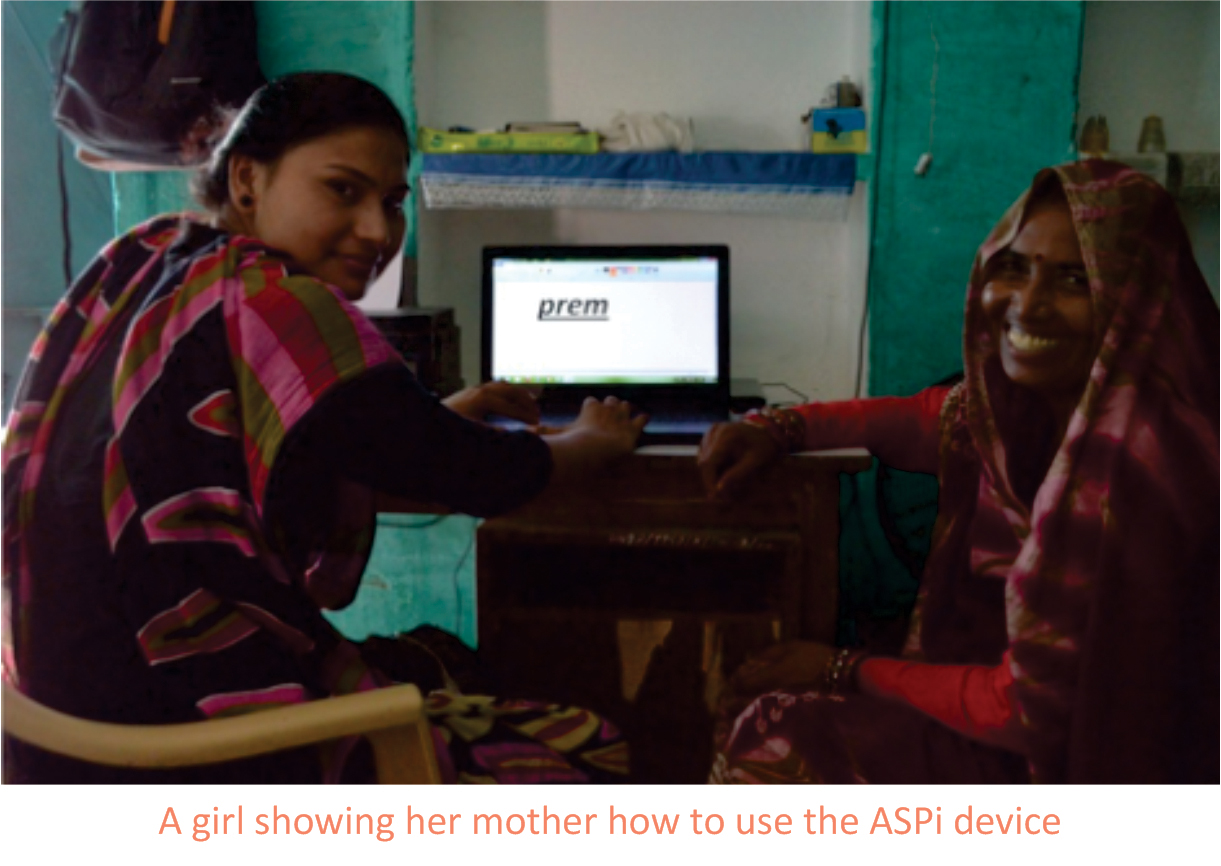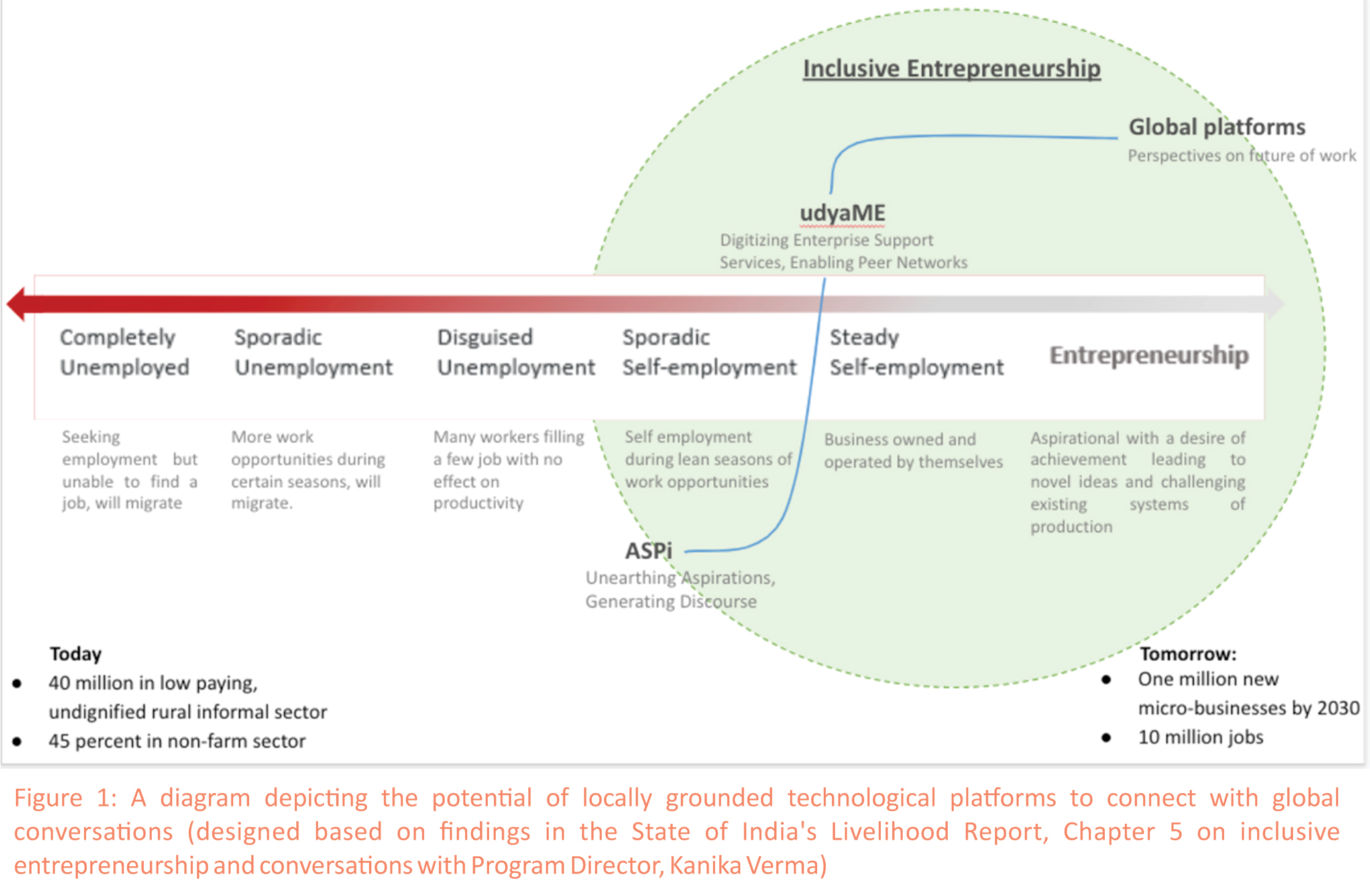|
Technology-driven Platforms
and the
Future of Work for Rural India
Within
global commentaries on development practice and the future of work, a
lot is said about the drawbacks of technological and digital platforms,
especially the inadequate access of the poor and marginalised to
smartphones or computers and the lack of skills to use them.
Additionally, practitioners argue that digital platforms are often
top-down and hyper-individualised given their use through smartphones,
leading to disconnections within communities and erasures of collective
narratives. The pandemic has further complicated matters. According to
commentators, globally, labour markets are disrupted, affecting the poor
and marginalised significantly. Remote work through digital platforms is
a reality for many, but these narratives exclude the facts of masses of
people. For many commentators, this reality is unfortunate and
impossible to alter, especially for those in the informal sector. For
global commentators and mainstream discourse, then localised
community-owned and designed technological platforms that can foster
collaboration within communities and connections with broader
conversations on the future of work can only be ‘science fiction’.
An experiment however is underway in some villages of Uttar Pradesh (UP)
to make science fiction a reality. Through experimentation,
possibilities are emerging for bridging local realities with global
perspectives on the future of work. A team of innovators and
practitioners from Development Alternatives (DA) and its partners, the
Indian Micro-Enterprise Development Foundation (IMEDF), Janastu and
Medha, are co-creating technological platforms with communities to
unearth aspirations and provide entrepreneurship support services.
 The first is a hyperlocal platform called ASPi that facilitates
conversations among young girls with its collaborative design. In the
pilot, one girl anchors the ASPi device becoming the medium for several
others to come together to discuss and debate life in their communities,
their aspirations and ways to reach their ambitions. The second is an
intermediary platform called udyaME that digitises enterprise support in
advice, tools and processes to start, run and manage businesses. It’s
spread in rural and peri-urban areas the team at DA and IMEDF envisions
through networks of enhanced common service centres (CSCs) called
Information Kiosks. The first is a hyperlocal platform called ASPi that facilitates
conversations among young girls with its collaborative design. In the
pilot, one girl anchors the ASPi device becoming the medium for several
others to come together to discuss and debate life in their communities,
their aspirations and ways to reach their ambitions. The second is an
intermediary platform called udyaME that digitises enterprise support in
advice, tools and processes to start, run and manage businesses. It’s
spread in rural and peri-urban areas the team at DA and IMEDF envisions
through networks of enhanced common service centres (CSCs) called
Information Kiosks.
The pilots for the experimental platforms, ASPi and udyaME took place in
the wake of the COVID-19 lockdowns in India, and young people and
entrepreneurs, including women at the grassroots, have upheld the
platforms, challenging mainstream assumptions about their lack of
awareness and skills in being able to use these platforms. The
innovators at Janastu shared, for instance, how their virtual sessions
to assemble the ASPi devices with the young girls who volunteered for
the pilot turned into conversations on the tenacity of several girls in
putting together the hardware themselves (using the instruction manual).
The practitioners at Medha further spoke of the growing curiosity around
technological platforms and devices due to the restrictions of physical
distancing.
The growing excitement of entrepreneurs around the use of udyaME in DAs
geographies in Bundelkhand and Eastern UP points to instances where
aspirations of entrepreneurs find the support to fructify. As
entrepreneurship and self-employment grows as an option in DA’s
intervening geographies, existing and aspiring entrepreneurs are
interested in figuring out how udyaME as an intermediary platform can
transfer enterprise support services directly into their hands to start
and grow their ventures. The entrepreneurs running Information Kiosks
recognising the changing dynamics of work are eager at the prospects of
being connected through udyaME to expand their offerings to provide
enterprise support.

The experiences with the information kiosks indicate the potentiality of
inverting the top-down supply-side view taken by multinational
conglomerates such as Amazon in designing what the future of work will
be. Aided by facilitative technological platforms, entrepreneurs in
rural India, our experiences show, capitalise on community needs and
global opportunities to digitise to contribute meaningfully to local
socio-economic well-being. Ideas are emerging to set up local e-commerce
platforms that connect the products available on hyper retail outlets
like Amazon with hyperlocal needs due to the gaps in Amazon’s address
identification system for rural India.
In essence, the experiments in UP ground the global in the local to
shape a future of work that is dynamic, responsive and inclusive of
rural realities. As we walk into the future, locally co-created
technological platforms are the mediums to ensure that ‘work’ for the
coming generations at the grassroots is not science fiction but
opportunities to contribute with purpose, building resilience and
solidarity. ■
References
Vrinda Chopra
vchopra@devalt.org
Shivankar Mohan
smohan@devalt.org
Back to Contents
|
 The first is a hyperlocal platform called ASPi that facilitates
conversations among young girls with its collaborative design. In the
pilot, one girl anchors the ASPi device becoming the medium for several
others to come together to discuss and debate life in their communities,
their aspirations and ways to reach their ambitions. The second is an
intermediary platform called udyaME that digitises enterprise support in
advice, tools and processes to start, run and manage businesses. It’s
spread in rural and peri-urban areas the team at DA and IMEDF envisions
through networks of enhanced common service centres (CSCs) called
Information Kiosks.
The first is a hyperlocal platform called ASPi that facilitates
conversations among young girls with its collaborative design. In the
pilot, one girl anchors the ASPi device becoming the medium for several
others to come together to discuss and debate life in their communities,
their aspirations and ways to reach their ambitions. The second is an
intermediary platform called udyaME that digitises enterprise support in
advice, tools and processes to start, run and manage businesses. It’s
spread in rural and peri-urban areas the team at DA and IMEDF envisions
through networks of enhanced common service centres (CSCs) called
Information Kiosks. 